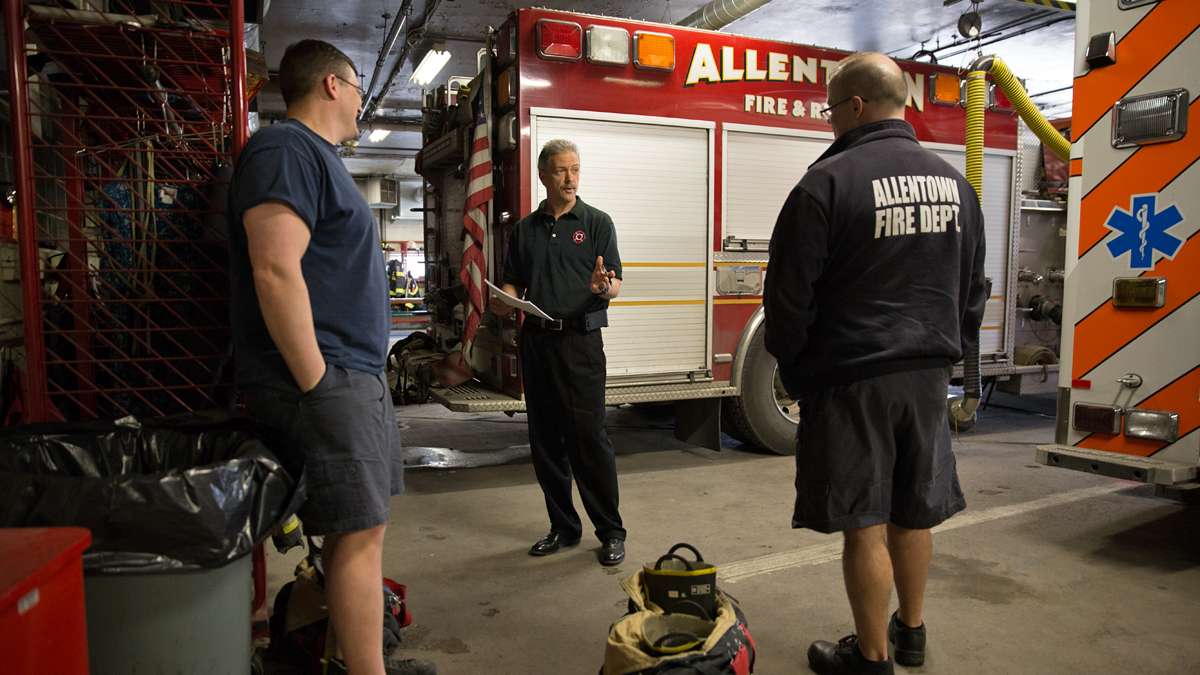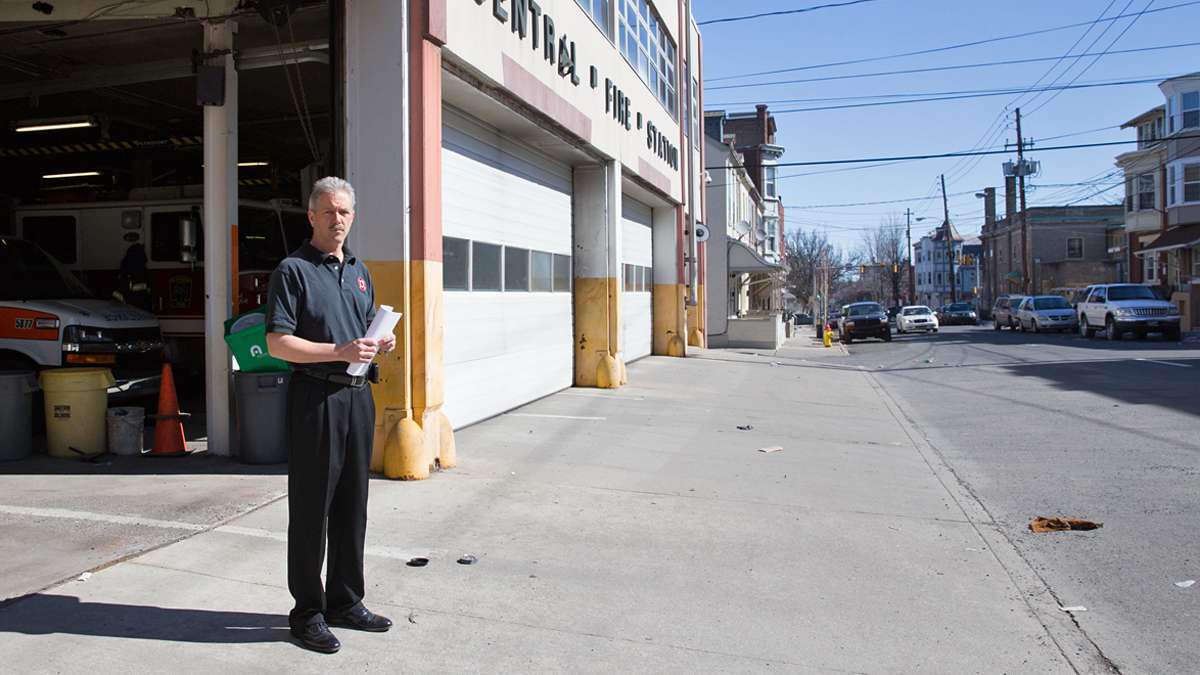Is it fair for city workers to use overtime to spike their pensions?
Listen-

John Stribula, president of Allentown's firefighter union, said the benefits were too good to pass up. He retired in 2011. (Lindsay Lazarski/WHYY)
-

In 2011, 43 Allentown firefighters retired before their labor contract expired, locking in more generous pensions benefits than the new contract would allow. (Lindsay Lazarski/WHYY)
-

At the end of his career as a firefighter, Stribula racked up overtime hours and increased his pension by about 20 percent. He said he answers to his family first
We’ll explore that question, and tell you about a spiking saga that unfolded in Allentown.
At the end of 2011, the city of Allentown had a problem. There was a gaping hole in its fire department.
No, not a literal hole. Forty-three of its firefighters retired at once. Not only did the city lose wisdom and experience. But suddenly, it owed millions of dollars more every year in retirement benefits it couldn’t afford.
What drove these city firefighters out of their jobs?
A generous labor contract, awarded under previous mayor Roy Afflerbach, that was about to expire. The firefighters wanted to lock in their pension benefits before that contract became less generous.
John Stribula, the president of Allentown’s firefighters union, retired in 2011.
Stribula says he loved being a firefighter. He still dreams about it, and his heart aches when he sees the other firefighters respond to emergencies without him. But the benefits were too good to pass up.
“I probably would’ve had to work another six, seven, eight, or nine years to get to the same pension that I was at, and if I were to become injured, that wouldn’t be possible,” Stribula said.
One of the perks of the contract was that it made it possible for the firefighters to spike their pensions.
Spiking across the state
Spiking is when a city worker puts in a lot of overtime at the end of his/her career in order to get more money in retirement. Pension benefits are typically based on a person’s final salary. Working more overtime increases that salary, and that means higher retirement payouts.
Some labor contracts allow overtime to count toward workers’ pensions and some don’t. For Allentown’s police and fire employees, it did.
When a firefighter was out sick or on vacation, the other firefighters would get calls asking if they wanted to fill in. Stribula usually turned down those calls. But at the end of his career, he started saying yes, and working a lot of overtime.
“I probably increased my pension 20 percent, maybe 25 percent of what it would have been,” he said.
In some cases, employees who spike end up taking home more each month in retirement than they did when they were working.
Spiking can be a big problem for cities. By nature, it’s unexpected. That means it’s hard for the city to account for when investing in its pension system.
And municipal pension plans are in trouble. At a press conference in January, Auditor General Eugene DePasquale pointed emphatically to a map of the 562 Pennsylvania municipalities that don’t have enough money to pay their pension obligations. “Without a comprehensive fix, all of these areas are going to be confronted with tax increases, and/or cuts to public safety,” DePasquale said.
Lawmakers and regulatory officials say spiking is part of that problem. But no one measures how much it happens or how much it’s costing cities across the state.
As a sampling: In Harrisburg and Philadelphia, all city workers except for police and firefighters are able to spike. In Reading and Lancaster, none of the labor contracts allow spiking.
Is it fair?
We asked readers what they think of spiking. Some called it unfair. One person said employees who spike their pensions should be publicly shamed.
John Emmons, who lives in New London Township, made an ethical appeal. “People still know the difference between right and wrong, and they should be able to judge whether what they’re doing is really right or opportunistic,” Emmons said.
But John Stribula, the union president, says he’s not ashamed. At the end of the day, he answers to his family.
“You talk to other people in the private sector and they admonish us, ‘oh your pension, your pension, your pension.'” he said. “And I say to ’em, oh you’re the one. You’re the one that wouldn’t have done it. You would have placed your priorities for the taxpayer above your own family. Well don’t ever say that in front of your family, because I don’t think they’d appreciate it.”
Stribula says he and other firefighters had the opportunity to work so much overtime because Allentown didn’t hire enough people to meet the department’s minimum staffing requirements.
While we’re on the topic of blame, it’s actually illegal for most Pennsylvania cities to give this benefit to their police and fire employees. The Third Class City Code, which applies to all cities except Philadelphia, Pittsburgh, and Scranton, does not include overtime in its definition of “salary” for pension purposes.
But some cities include overtime in pension benefits anyway, and no one stops them, says Jim McAneny, executive director of the state’s Public Employee Retirement Commission. There’s no one whose job is to enforce this rule in city pension plans, McAneny says. “So it’s left up to the local government.”
How it happens
Why would a city give workers the opportunity to spike?
“It’s called kicking the can down the road,” said McAneny.
He says elected officials sometimes give workers the opportunity to spike instead of giving them higher salaries.
“If I include the money in your paycheck, I’m going to have to take it out of this year’s budget,” he said. “If I put it into the pension instead, it’s gonna be someone else’s problem down the road.”
McAneny says politicians sometimes agree to allow spiking in exchange for support in elections.
Allentown Mayor Ed Pawlowski says it’s a problem that pension benefits are decided during collective bargaining. He hopes for a statewide system for municipal pensions. “If we don’t address these functional issues on a statewide level, we are going to see municipality after municipality in the state fall like dominoes on a board,” Pawlowski said.
Lawmakers, including Rep. Seth Grove (R-York) and Rep. Keith Greiner (R-Lancaster), have also called for a statewide municipal pension system.
In 2013, Allentown tackled its $160 million pension debt by leasing out its water and sewer system to a private company. Its current (2012) contract with the firefighters makes it almost impossible to spike. But that contract is up again this year.
WHYY is your source for fact-based, in-depth journalism and information. As a nonprofit organization, we rely on financial support from readers like you. Please give today.



